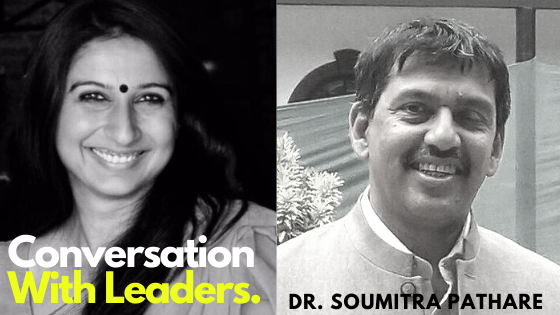How To Measure The Mental Health Status Of An Organisation? Dr. Soumitra Pathare Has The Answer

Note from the Editor: Ungender Insights will now feature an occasional longform feature from industry leaders or the blog team. This series is a new addition to the blog. We believe that longform content is important for our area of work and also relevant to readers who value insight on topics that are often complicated, nuanced and take time to grasp. While it is absolutely true that we are living in the instant-gratification age of short attention spans – we think it is important to sometimes present the “whole story”. We hope you enjoy these pieces.
This interview has been edited for longform text.
Written By: Rituparna Chatterjee, 🖊 edited by Varna
The effects of the lockdown and job losses during the Covid-19 global pandemic on mental health, are going to be long-term and devastating. As people live in a state of uncertainty and anxiety, there are several steps the government and private organisations can take to ensure the mental well-being of their employees. In a conversation with Ungender CEO, Pallavi Pareek, Dr. Soumitra Pathare, Director of Centre for Mental Health Law and Policy at the Indian Law Society’s Law College in Pune, explains how to measure the mental health status of employees in a company and the role leadership plays in an equitable workplace for all.
Q: We are all worried about how this whole COVID-19 episode has affected everyone’s life personally. Can we say for sure that India, in times, to come is looking at a mental health crisis?
A: I’m not an astrologer, and I can’t foretell what will happen. What I can say is only based on what we know from the past. What we do know is everyone’s anticipating that there will be an economic crisis after the COVID lockdown is over and it’s worth looking at past economic crises and looking at the mental health impact they had.
Take Greece, for example, in the three years that followed the 2008 crisis suicides shot up by a significant number. So if you look at 2009, 2010, 2011, 2012, the numbers went up by 17% 25% and then 40%. We know from other economic crises too, for example, that alcohol misuse or alcohol dependence increases. You’re going to see more alcohol related problems, you’re going to see suicides, and you’re going to see a general increase in mental health issues.
Q: In the economic crisis, we see a lot of layoffs taking place. People will increasingly be required to deal with their own mental and emotional well-being. How should companies strike a balance between taking care of an organisation’s financial well-being and employees’ mental well-being? What impact will this have on domestic violence?
A: There is a three way relationship between domestic violence, alcohol use and suicides. In India, for example, one third of women who die of suicide report a history of domestic violence. Domestic violence tends to be higher in families where the spouse has a problem with alcohol. It can therefore be said that Alcohol directly increases suicides through domestic violence, and now the economic crisis is just exacerbating the issue.
Now the good news about mental health issues is that we know from past experience, that mental health issues crop up after a lag between the causative event and the outcome of that event on the mind. So, there’s going to be a six month or 12 month lag period before the mental health crisis will hit us. Something that we should be doing now, having learned from the COVID crisis is to actually put in place, and build up our mental health system that is in utter shambles at the moment. Waiting for another six months down the road when the crisis hits us is not going to help.
The second thing that employers can do and governments need to do is to try and take people’s mind off the anxiety of job loss. For example, Canada has said that for every employer, the government will pay out 80% of the salary, if jobs are lost. Wage security is particularly important in countries like India where there is no social security net.
I think being very clear about what is going to happen in the six months or 12 months to come, can actually help your employees start to plan their own future, rather than live in this kind of constant anxiety not knowing what bad news will strike them the next morning.
Q: Is this a time when companies should seriously and sincerely start allocating budget and resources toward trained counsellors in the workplace?
A: I think I would always say that a crisis is an opportunity. What we can do is to try and minimise the impact of our processes on people’s mental health. There are two other important reasons. Mental health is also tied to physical health. So if you’re not well mentally, it’s going to impact your physical health and secondly, it impacts your productivity, which is described as presenteeism, which means people are present but not actually performing as well, because there is a hidden mental health problem which is not being addressed. I tend to have a very different opinion on this idea of having counsellors at the workplace and maybe that’s not the mainstream opinion.
I actually don’t believe you should have counsellors at workplaces. Even in normal circumstances when job losses are not an issue, how many of us would want to walk through a door in your office which says counsellor? The stigma associated with having to see a counsellor in the workplace where you’re working is so high, that we know from experience, whether it is schools, whether it is colleges, whether it is workplaces, people do not approach the workplace counsellor.
When companies are now likely to downsize, you don’t want to be the person who has a mental health problem and now you’re worried that your company will say, “Oh, one more reason why he should be on the block rather than somebody else, you know.” There are better options.
One of these is having an employee assistance programme, which is independent of the company, and where there is complete confidentiality. The other thing to do is provide medical insurance which allows somebody to go and see a counsellor, or take help from a counsellor or have a list of counsellors who you can recommend to your staff. Workplaces also need to actually accommodate mental health issues — for example, somebody with a mental health problem may have difficulty waking up early in the morning. In which case, they might want to say listen, “it’s okay if you start late and leave late because that suits you better.” Or maybe once in 15 days, if they need to go and see their counsellor and need two hours off for that. A workplace that can assure a person that it is fine to do a 12 to 7 instead of a 9 to 5 (same amount of work) is a sensitive workplace.
Q: What are some of the things companies can do to create a positive mental health culture?
A: One of the things that I’ve noticed is that usually HR is not an influential department in companies. Equally true is that even within HR departments, the role of mental health and well-being is seen as a very soft thing. It’s not seen as one of the most important things, and is instead delegated down to the lowest rungs of the hierarchy.
One of the things that HR probably needs to do right away is to have the top person within the HR department say, “this is an important part of what I want to be doing”. The second thing is, for all companies to realise that your employees don’t believe what you say, as much as what you do. For example, if you talk about mental health and how it is important, but there is a record that demonstrates every time somebody has a mental health problem, they are asked to leave, then clearly what you do is very different from what you’re saying. HR departments need to also sometimes do the obvious thing — if somebody looks depressed then say, “listen, can I sit down with you and find out what’s wrong? Just talk?” It doesn’t require major processes.
Peer counselling is a great thing to try. You’re more likely to talk to somebody who works with you because you spend eight hours a day with them, you’re comfortable talking to them. If your peer counsellors are trained then you’ve got a resource within your own company, rather than having to ask people to go out.
Q: People come from diverse gender, socio-economic backgrounds, as well as cultural profiles. Often this means that the tech available to each employee at home is also different and this can affect mental well-being too. How should HR work around these things?
A: Often dealing with people with mental health issues is seen as charity. I think that’s the wrong way to go about approaching it. You don’t have to be nice to people and you don’t have to go out of your way to help people because it’s a good thing to do. I would appeal to employers self-interest. It’s very simple, look at the costs of depression. For every 10 rupees that depression costs us and costs society, only about rupees 2 is actually spent on treatment. The remaining 8 rupees is almost completely accounted for by a reduction in output.
This suggests that depression in employees is a loss to companies. Depression tends to be like an iceberg, you see the bits above the water, but there’s a whole big bit under the water – in this case the bit under the water is the effective price that companies are paying without realising it. There are estimates from the UK and USA, for example, which say that depression probably reduces GDP by 1% to 2% .
My point is that companies need to stop seeing this as charity. I’m not even asking them to see this as a matter of labour rights.
Q: Is there any metric that exists right now, that will allow companies or an HR department to measure mental well-being of the employees?
A: One of the easiest metrics to measure is absenteeism. There is a lot of evidence to show that absenteeism is a good proxy indicator of mental health in your company. If you want to know the mental health of your employees, look at absenteeism rates.
Presenteeism is an equally big problem with mental illness. Somebody who’s mentally unwell comes into work, but it’s not productive at all because we’re just there and they kind of waste their time because they just can’t bring themselves to the work. Employees don’t say, “I’m not coming to work today because I’m depressed.” Employees will say, “I’ve got a cough, I’ve got a cold today, I’ve got a fever today.”
So, very often if you look for mental health reasons for absenteeism, you’ll probably find none. What you’ll find is when people are upset they always use physical metaphors. When we talk about anxiety we see a knot in the stomach. Or we say, “Oh, he’s such a headache/ he’s giving me a headache.”
Q: This becomes more difficult when you expand the definition of the workplace. When we look at the workplace as a workplace, which could be any place, it becomes more of a challenge. So, how do you suggest that HR navigate such situations?
A: Organisations which have always relied on structural factors to ensure that their employees were productive, for example, having a check in and checkout time, for such organisations this transition will be much more difficult to do. On the other hand, organisations which were not focused on the structure, or time, but were actually focused on having some deliverables done in a certain time, will in my opinion not find this new. I think what HR really needs to do is to shift their focus from structural monitoring to outcome monitoring. For HR, especially when you’re doing remote work, to shift people’s thinking to say, “look, we’ll focus on outcomes will not focus on outputs,” is very important.
Q: While we are talking about HR putting in systems and being proactive, how should companies go about handling a situation when an employee decides to open up about a crisis going on in their personal life?
A: There is this weird idea in people’s heads that only a professional can talk to a person with mental health problems. It is as if people with mental health problems have green horns. Anyone can talk to anybody, and very often what you need is just basic human contact. You don’t have to be an expert. For example, active listening is to be able to listen to somebody, with full attention.
***
Watch the video of this conversation below;
If you are feeling suicidal or have suicidal thoughts, please know that you are not alone and that every life is worth preserving.
Help is at hand, please visit http://www.spif.in/seek-help from the Suicide Prevention India Foundation or visit the nearest hospital immediately.
If someone you know is struggling with depression, anxiety or feeling suicidal please help them find a support system. We recommend joining Now and Me a mental health community online for unbiased and non-judgemental sharing of fears. Read up as much as you can on the Alternative Story and perhaps recommend counseling.
If you feel you cannot afford therapy here is a crowd-sourced list of young-adult and pocket-friendly therapists. If you feel that mainstream therapy is not for you, here is a crowd-sourced list of trusted feminist/queer-affirmative therapists across the country.
Please remember that iCall has a chat function too should you prefer chatting via an app to telephonic support. Your local therapist may be able to support too if helplines are temporarily overwhelmed.
You can download this card, with all this info, to save or share with a loved one, from here for free.
We care ♥
About the author: Rituparna Chatterjee is a journalist with close to two decades of experience in journalism, working across media platforms, and tracking ground-up stories of feminist movements, social inequalities, gaps in gender discourse, and communities. She currently oversees communications for Ungender Legal Advisory
Ungender Insights is the product of our learning from advisory work at Ungender. Our team specializes in advising workplaces on workplace diversity and inclusion. Write to us at contact@ungender.in to understand how we can partner with your organization to build a more inclusive workplace.
Read our insights about diversity, legal updates and industry knowledge on workplace inclusion at Ungender Insights. Visit our Blog.
Sign up to stay up-to-date with our free e-mail newsletter.
The above insights are a product of our learning from our advisory work at Ungender. Our Team specialises in advising workplaces on gender centric laws.
or email us at contact@ungender.in




